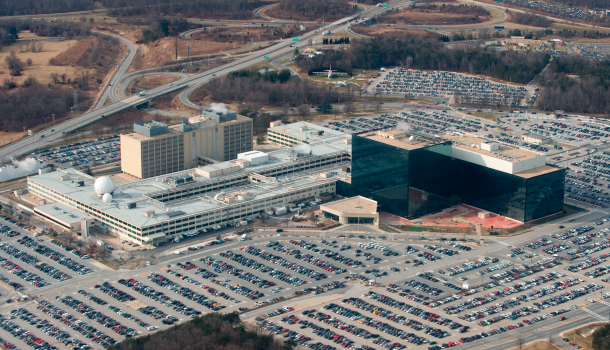
THE NATIONAL SECURITY AGENCY (not exactly a small building…)
In a major revelation of just how extensive post-9/11 privacy intrusions have become in the United States, we now know that (at least with regard to Verizon customers), that our own government routinely collects the telephone numbers of every domestic and international call, specific GPS location data, the duration of each call, a host of other unique identifiers (vaguely described as “harmless meta-dataâ€), and the exact time every call is placed. Although the contents of these conversations are not disclosed (or so we’re told…), government algorithms can nevertheless piece together enormous amounts of personal information far faster than it took you to read this sentence.
One simple way to grasp how such information could easily be used to violate individual privacy rights might go something like this: Person A (a husband, an attorney named Bob) calls Person B (Jane, Bob’s wife, a doctor) nearly every weekday at around 6:00 PM just before or after leaving work. The NSA knows that these calls nearly always originate from Bob’s office or Bob’s cell phone (which the NSA can also track as it travels a predictable route toward Bob’s and Jane’s house). The calls typically reach Jane either at her office, at the couple’s home or on Jane’s cell phone (the location of which is also captured via GPS). On an average evening, Bob and Jane talk for approximately ten to fifteen minutes. This conduct repeats itself consistently for several years – day in and day out. But then . . .
Suddenly, Bob starts placing calls to a new number at 5:45 PM on Tuesdays – this time to Person C (easily identifiable through her own phone number – and by using some of that “harmless meta-data†– as a woman named Sarah – a woman who happens to be a dark-skinned Hispanic). Those calls are always placed cell-to-cell and usually while both Bob and Sarah are driving in the direction of a specific motel out on the edge of town. At 6:00 PM, just before reaching the motel, Bob places a two minute call to his wife.

Bob and Sarah remain at the motel for roughly two hours at which point Bob’s cell phone is again picked up by the NSA as he drives back to his office and checks his voicemail while Sarah’s cell is used to call Person D (Dave, her husband, a guy who just happens to work at… you guessed it the NSA…) Each of these Tuesdays conclude with Bob first using his office phone to call his wife who he then usually calls a second time from his cell while driving either to pick up some food, or occasionally to a flower store or jeweler – all of which the NSA can combine with credit card data to figure out exactly what he is purchasing before heading home to see Jane.
SOME ANALYSIS:
Obviously, the one part of this fact-pattern that’s at least somewhat unlikely is the fact that Dave is an NSA employee (although the agency is thought to employ at least 20,000 people). But let’s first take that concept as a given and consider the implications. Say, Dave suspects his wife of cheating, so one day he decides to run a simple search algorithm. Specifically, he just enters Sarah’s number, selects a date-range covering the past two and a half years and clicks his mouse.
What Dave discovers (probably in less time than your basic Google search) presents some fairly troubling circumstantial evidence. Especially if his wife had recently told him she would have to be coming home late on Tuesdays because of new training sessions AT HER OFFICE. Moreover, she has asked Dave not to disturb her during these meetings. With his suspicions aroused and his jealousy growing by the second, he calls his wife’s boss who claims not to know anything about these supposed “training sessions.†What happens next could be anything from a very unpleasant husband-wife confrontation to Dave breaking down the motel door with a gun in his hand.
Now the question is, why is all this so concerning, since Dave, like most of us, almost surely doesn’t actually work for the NSA? My basic answer is that there at least three reasons:
(1) Even if this particular scenario could only ever happen to a relatively small number of people, that doesn’t change what should be an obvious ethical answer: it should NEVER be allowed to happen TO ANYONE.
(2) Government computers get hacked ALL THE TIME.
(3) There are countless other conclusions the NSA could properly or improperly draw from the above information – and remember, normally the NSA folks would be combining my tiny example with vastly greater amounts of data – data that could most certainly set off what are referred to in “NSA-speak” as “triggers.â€
This time, let’s suppose Bob is an ACLU attorney representing someone accused of terrorism so the NSA begins to think he might be having secret motel meetings where he’s conspiring to assist his terrorist client. With this information (and some additional legal surveillance – they photograph Hispanic Sarah and decide she “sorta looks like an Arab,†at which point they throw to together a storyline, head over to a top secret courthouse and obtain a FISA warrant issued by top secret judge. That warrant grants them a totally new right: to start listening-in on every single call Bob has with his mistress – calls that quickly become very popular “entertainment” at NSA happy hours because of Sarah’s frequent tendency to talk dirty . . .
Even worse would be if Bob and Sarah DON’t talk about sex . . . Instead the NSA overhears them discussing how “evil†the US drone program is and their belief that the prisoners being held at Guantanamo should be immediately released. During one such call, “sorta Arab-looking Sarah†angrily exclaims: “Damn it all, Bob – It just makes me so angry, I’d like to kill those bastards at the CIA!”
Guess who just won a one-way first class ticket to a secret prison somewhere in Morocco?

Sure, Obama officials and Bush officials are both probably correct that this type of mass surveillance program has prevented and will prevent acts of terror. The point, however, is that there are other ways of doing so without trampling on the fundamental rights of every American citizen. Would eliminating this program make things harder for the government? It probably would. But as conservatives NORMALLY SUGGEST ABOUT VIRTUALLY EVERY OTHER ASPECT OF GOVERNMENT, that’s not always such a bad idea.
[“Obama administration defends ‘critical’ NSA phone records collection,†The Guardian, 6/6/2013]



